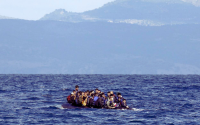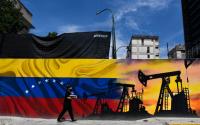E.A. Khamas
Sudden closing of the roads is a big problem
We had to attend a very important meeting on reconstructing Falloja. Mohammad, of the Human Rights Organization in Falloja, told us that we have to be in Falloja Cement Factory, where the meeting is held, at 8 am. We did our best to be in time, but the high way was closed just near the cement factory, we had to go all the way back to take a side road. When we were there, the meeting was over, the head of the Reconstructing Falloja Committee, Mr. Fawzi, was leaving. Mr. Samir, a director in the factory, volunteered to talk to us."Closing the roads is a big problem, soldiers close the roads at any minute, there are no signs, and people do not know which road is open and which is closed at a certain moment. They have to be very careful. We lost an employee in the factory because of this problem. Hadi Saleh Hantoosh, who was leaving the factory, did not know that the road he came on in the morning was then closed. He was shot dead by the American soldiers. An ambulance driver was also shot dead, he had an emergency case, again did not know that the road was just closed".
30.000 Completely Destroyed Buildings
Mr. Samir told us that 30.000 buildings were totally destroyed in Falloja in the October attack. The estimated funds to rebuild them are at least $500 million. The Committee was promised 20% of this amount, which is $100 million. "How many families received the money tell now?""None" replied Samir" we are supposed to begin today giving people their compensations". It was March 14, more than five months after the October attack."What about schools, hospitals, streets and public buildings?""They need special projects, the money we are talking about are just for the houses""What about services, water, electricity, telephones, garbage…etc""Dr. Ni'ma Al-Jaser, of WHO was not allowed to enter the city, also Mr. Elia Tambori of the UN, was not allowed" replied Mohammad of the HRO.…Inside Falloja, life was beginning to return back. Some shops were opened, although destroyed. People were living in the rubbles. Some families were working on removing them. Some put their tents in the middle of the rubbles.
Abu Qeis Abu Qeis is one of them. A retired man in his sixties looks after a family of 25, in Gebeil area. He has 10 sons, 3 daughters (one of them is a widow with 4 orphans, whose husband was killed in the war March 2003), his wife, his daughters in law, (one of them is again a widow with 3 orphans). When the American attack on Falloja began in October, the whole family left to Halaabsa, a town to the west of Iraq, to live in a school, Iben Roshd, with other 14 families. When he left Falloja he locked the bathroom door of his house. He was forced to return back to Falloja after 4 months. Iben Roshed school director told the families to leave because the school was supposed to reopen, and because the war has stopped. When he returned to Falloja, he found that his house was completely damaged, but the bathroom door was still locked. "Obviously there was no one living in the house, there were no Mujahideen hiding, so why they destroyed it?" Gebeil was one of Falloja areas that were totally destroyed. It looks as if an earthquake has ridden the place and leveled it to the ground. It sits on the way of one of the American troops entrances inside Falloja.Abu Qeis believes that his house was destroyed by a tank, not by bombing. "There are no signs of explosion, all the furniture is crushed, and we are using it now as wood for the fire. We hear talks about compensations, and we are waiting". Abu Qeis puts a tent near his house rubbles, and is living with his family there. It was given by the Red Crescent. Abu Qeis pension is 100.000 Iraqi Dinar ($75). He receives the pension every three months. "I am called the Responsible of the Widows" he laughs showing broken teeth. There were too many widows in the tent, cousins and nieces. Each was very eager to talk, each with a story and a problem. The major one was a roof to live under, and medicines.
Amiriya Complex
We heard about the same problem in Amiriya complex, 25 kilometers west of Falloja. In the Complex Local Council hall there were 5 families, living in separated tents. Two babies were just born in the camp. The families were told to leave the hall or else they are going to be arrested. "What are you going to do now?" I asked the men."Run away, we can do nothing else. We have no money to rebuild our completely destroyed houses, they are not convenient to live in at all, and we do not want to be arrested" said Nadim, who spent 9 years in Iran as POW. In Ibn Al-Nadim School for boys in the same complex, 40 families were still occupying the class rooms. A British charity organization (built) tent class rooms in the yard for the boys to attend classes. There was a big sign in English referring to the Charity org. There were at least a dozen of class tents in the yard. Mrs. Mariam, the assistant director, was furious "We can not go on like this, the world has to see this tragedy, we are drowned in the dust here, the children are getting sick, we do not give them breaks because it is unhealthy to play in this dust, and also we have to close early because there is a girls school after the boys, and I do not know why they put the sign in English, our language is Arabic, do they want to humiliate us or just to show of".
Mariam's son does not attend school either. He is a student in another school, Al-Faris Al-Arabi High School in the same complex. But the school is occupied by the American troops, who invaded it one night and in the morning they turned it into a military base. …. Working like BeesA Sheikh in Jolan Mosque told us that Fallojans are working like bees, rebuilding their houses, without waiting for the promised compensations. At the beginning they refused to live in Falloja, seeing all the destruction. His wife slapped her face and cried bitterly when she first saw her ruined house. Now she is living among the rubbles. But the Sheikh insists that before talking about rebuilding we have to ask why? Why children were torn apart, why women were exposed to killing and humiliation? "Now it is us who are asking for Al- Zarqawi? Where is he? Our city, our history, our documents, our libraries are all erased; we want to know why is that? We told them there is no Zarqawi here, we are not responsible for terrorism, and we did not open the borders? They are responsible for that, why is it that American can not control the borders?"
Occupying HouseIsmael, a friend of the Sheikh was even angrier. His house was occupied by the American soldier, they ruined the house. But that was not the reason why he was so angry. "They put human waste on the Holy Qur'aan. I did my best to clean it, but could not, it was too late".Occupying houses in Falloja by the American troops, using them as offices or lodgings, or just using them temporarily is familiar. Abu Mohammad, who has a big new house, looking on the river, told us his story."They came at 2 am one night, told me to leave with my family. I asked them where to go at this hour; they said it is your problem. They stayed in the house for 3 days. After they left, we used a whole box of detergents to clean. They used the curtains to wipe their boots, they put human waste in the pots, and boots traces were every where on the newly painted walls. They took an old pistol that I inherited from my grandfather. I went to their base four times asking for it, but it is gone. Next time they came, they did not tell us to leave. They told us to remain in one room. It was very difficult. They gave us 15 minutes to prepare the bread; it normally takes at least one hour. Bathroom was the most difficult, you cant imagine with all the women and children"
The MissingWhen we visited the Al-Mostafa Mosque refugee camp in Baghdad university (where 175 families were living) last month, the Sheikh told us that the refugees organized a demonstration protesting their inhuman conditions and asking for compensation and for international organizations to visit Falloja and see for themselves what happened. They did not get any reply. But many families had to go back looking for the missing ones. Um Ahmad, 35, was looking for her son, Ahmad who decided to stay with his friends when the family left. He was calling them every day, sometimes asking how to cook a certain dish…then he disappeared. They checked in all the probable places, morgues, but there is no trace of him.Um Omar, 51, is asking about her son, Iziddeen, who is missing since November.Ahmad Ramzi, 10, is asking about his father who was supposed to be arrested 2 days before Eid(mid October), but no trace is found of him in any prison or military base near Falloja. In Amiriya complex refugee camp, Abdul Rahman was asking about his mentally retarded brother, Khidhr Ali Abdulla, 25, who is missing for 5 months. The problem with all these families and many others is that they do not know what to do, where to go, and whom to ask about the missing. I suggested that they look in lists of bodies evacuated more than a month after Falloja was attacked. Some of these bodies were decomposed beyond recognition, but it is a place where they can look for their beloved ones.






